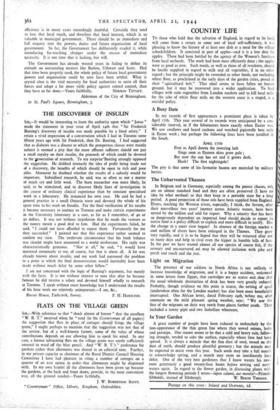COUNTRY LIFE
To those who hold that the salvation of England, in regard to its land, will come from a return to some sort of local self-sufficiency, it w 1, pleasing to know the history of at least one dish at a meal for the village schoolchildren. It consisted in part of apples—and it is a late date for apples. These had been bottled by the agency of the Women's Institu'e from local orchards. The work had been most efficiently done ; the apple; were as good as new. Such meals, as well as those of all residents, should be locally supplied in regard to milk and all vegetables, if in no other regard ; but the principle might be extended to other foods, not excluding wheat flour, as proclaimed in the early days of the garden cities, proud of their " agricultural belt." That ideal seems to have fallen on barren ground, but it may be recovered into a wider application. To feed villages with stale vegetables from London markets and to kill local milli for the sake of white flour mills on the western coast is a stupid, is a suicidal policy.
A Busy Date
In my records of first appearances a prominent place is taken by April t7th. This year several of its records were anticipated by a con- siderable interval, as if the hibernators knew exactly when Easter vvai. We saw swallows and heard cuckoos and watched pipistrelle bats early in Easter week ; but perhaps the following lines have been justified in the South.
APRIL 17TH Ever as April dawns the towering lark Sings soon as Eastern skies grow pale ; But now the sun has set and it grows dark.
Hush! The first nightingale!
The pity is that some of his favourite haunts are encircled by military lorries.
The Unharvested Thames In Belgium and in Germany, especially among the poorer classes, eelk are an almost standard food and they are often preserved (I have no idea by what method) so that they keep in a portable state for a long period. A good proportion of those eels have been supplied from England. Elvers, reaching the Western rivers, especially, I think, the Severn, after their marvellous two years' journey across Atlantic waters, have been netted by the million and sold for export. Why a cduntry that has been so dangerously dependent on imported food should decide to export its native food is a policy difficult to explain and more difficult to justify. Has the change to a saner view begun? In absence of the foreign market a cool million of elvers have been enlarged in the Thames. They grow very rapidly, and it is to be hoped that they will be returned after not so many days and help to rival even the kipper in humble bills of fare. In the past we have wasted almost all our species of coarse fish, if the savoury and sea-nurtured eel may be allowed inclusion with pike and perch and roach and the rest.
Light on Migration
The presence of our soldiers in North Africa is not unlikely to increase knowledge of migration, and it is a happy accident, welcomed in some letters from Egypt,. that cartridges are so scarce and dear that the usual wholesale destruction of duck has been very greatly reduced. Probably, though evidence on this point is scarce, the netting of quail (undertaken often for the London market) has also been most beneficially interrupted. One African letter, dated February 24th,' before me, after comment on the mild pleasant spring weather, says: " We saw the first of the migrants on their way north from places further south. They included a tawny pipit and two Isabelline wheatears.
In Your Garden A great number of people have been reduced to melancholy by the non-appearance of the thin green line where they sowed onions, leeks and parsnips. One reason seems to be that a cold and heavy rain, follow- ing drought, tended to cake the surface, especially where lime had been spread. It is always a miracle that the fine dust of seed, tossed on the dust of earth, should produce plentiful greenery ; but the miracle may be expected to occur even this year. Such seeds may take a full month to acknowledge spring, and a month may seem an inordinately long delay. One of the very best gardeners that I know waters his row; most generously a good twenty-four hours before sowing and neve- waters again. In regard to the flower garden, in discussing plants with the longest flowering periods I wrote—lapsu calami, aut mentis?—Primule
Postage on this issue : Inland and Overseas, id


























 Previous page
Previous page